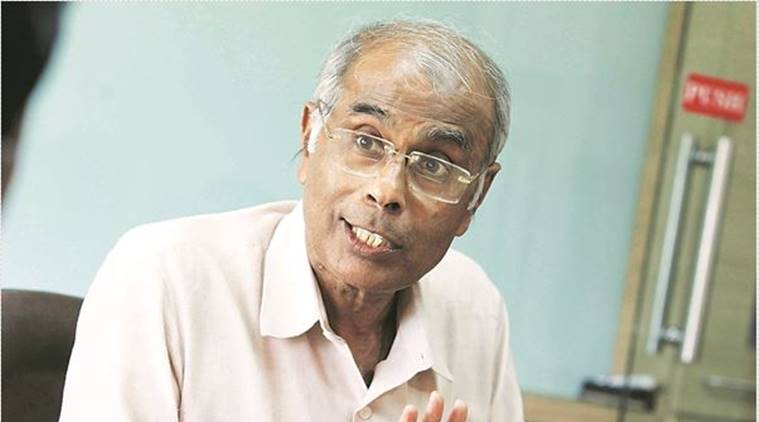 Narendra Dabholkar, a 67-year-old anti-superstition activist, was killed in August 2013. (File Photo)
Narendra Dabholkar, a 67-year-old anti-superstition activist, was killed in August 2013. (File Photo)
Nearly three weeks ago, on February 13, the Bombay High Court had expressed concerns about the delay by investigative agencies in probing the murders of Dr Narendra Dabholkar in Pune and Govind Pansare in Kolhapur.
Dabholkar was shot dead by two men while he was on a morning walk on the bridge near Omkareshwar temple in Pune on August 20, 2013. Pansare was shot at near his residence in Kolhapur on February 16, 2015. He succumbed to his injuries days later.
The CBI, which is probing the Dabholkar murder, had told the court that the search operation to retrieve the weapon used to kill Dabholkar, which was dumped in the creek near Thane by the accused, would be completed in a month.
Now, the agency claims to have recovered a pistol from a creek of the Arabian Sea near Thane and it is being investigated whether the same weapon was used to kill Dabholkar. However, since the probe into the murder started seven years ago, there have been different versions about the weapon used for killing the anti-superstition activist, and where it finally ended up.
Linked to ‘arms dealers’ Nagori, Khandelwal
On June 20, 2014, Pune City Police, which was in charge of the Dabholkar murder case then, arrested Manish Nagori, an alleged dealer of illegal firearms, and his aide Vilas Khandelwal, both hailing from Ichalkaranji in Kolhapur district.
Incidentally, Nagori and Khandelwal, along with their aides, were arrested by the Thane Police’s Crime Branch on the very day Dabholkar was murdered in Pune, for allegedly demanding Rs 15 lakh extortion money from a Mumbra-based businessman.
The arrest took place at about 4 pm, hours after Dabholkar was murdered in Pune at 7.25 am. Two months later, in October 2013, Nagori and his aides were placed under arrest by the Maharashtra Anti-Terrorism Squad (ATS). Nearly 40 illegal firearms were allegedly recovered from them and sent for ballistic tests. A ballistics report suggested that one of the firearms seized from Khandelwal matched with the “markings” on a cartridge seized from the Dabholkar murder spot in Pune.
After the ATS wrote to the Pune police about the cartridge, Pune cops initially arrested Nagori, Khandelwal and two others in connection with the murder of security guard Prahlad Jogdandkar, who was shot dead in Savitribai Phule Pune University campus on May 3, 2012.
Police then arrested the duo for the murder of a 30-year-old unidentified man in Hinjewadi. Pune cops then put the duo under arrest in the Dabholkar murder case. When they were produced in court on January 21, 2014, they claimed that then ATS chief Rakesh Maria had offered them Rs 25 lakh for confessing to Dabholkar’s murder. They also alleged that narco and lie-detector tests were conducted on them while they were in police custody earlier.
However, during later hearings, Nagori and Khandelwal told the court that their allegations against Maria were part of an “emotional outburst”. After a few months, both Nagori and Khandelwal were released on bail by the court.
Meanwhile, in June 2014, the CBI took over the probe in the Dabholkar murder case following an order by the Bombay High Court. But Nagori and Khandelwal have not figured anywhere in the CBI’s investigation so far.
Linked to Tawade, Akolkar
Based on witness statements made by a Hindutva activist and metallurgy expert Sanjay Sadvilkar, the CBI arrested Sanatan Sanstha seeker Dr Virendrasinh Tawade in the Dabholkar murder case on June 10, 2016.
In the CBI’s chargesheet against Tawade, absconding Sanatan Sanstha activists Sarang Akolkar and Vinay Pawar were named as the assailants who shot dead Dabholkar. The chargesheet, submitted to the court on September 8, 2016, stated that Tawade “desperately wanted cartridges for pistol/revolver in June/July 2013 from Sadvilkar and used the code name ‘chocolates’ in place of ‘cartridges’…within one to two months of this incident, Dabholkar was murdered in August 2013.”
The chargesheet also stated details of a purported email conversation between Tawde and Akolkar, who was also wanted in connection with the 2009 Goa blast case, and against whom a Red Corner notice was issued by Interpol in July 2012.
“One email dated April 20, 2009, from Sarang Akolkar to Tawade, mentions the availability of country-made arms (deshi banavatiche sahitya) in Uttar Pradesh and Madhya Pradesh. It also mentions the availability of foreign-made arms (pardeshi sahitya) in Assam. Here, coded language has been used. The email also mentions raising an army of 15,000 persons for financing the procurement of firearms (sahitya)… In pursuance of the criminal conspiracy, Tawade and Akolkar again surfaced at Kolhapur and met Sadvilkar in 2013… they also wanted to manufacture weapons with the help of Sadvilkar. Akolkar had, for this purpose, brought the sample of one country-made pistol and one country-made revolver of high quality,” stated the chargesheet.
Linked to Andure and Kalaskar
In August 2018, CBI arrested Hindutva activists Sachin Prakashrao Andure and Sharad Kalaskar in the Dabholkar murder case. Contradicting its earlier claim, the agency alleged that Andure and Kalaskar had opened fire at Dabholkar on August 20, 2013. Kalaskar is also an accused in the murder of journalist Gauri Lankesh in 2017.
The CBI also arrested advocate Sanjiv Punalekar in May 2019, alleging that the lawyer had asked Kalaskar to destroy the firearms used in multiple murders, including that of Gauri Lankesh.
According to the CBI, following Punalekar’s instructions, Kalaskar had allegedly dismantled four country-made pistols (he took out the barrels and sliders containing firing pins) and threw the parts from a bridge in Thane Creek on July 7, 2018.
The CBI had hired a foreign agency to carry out a search operation to retrieve these weapons from the creek.